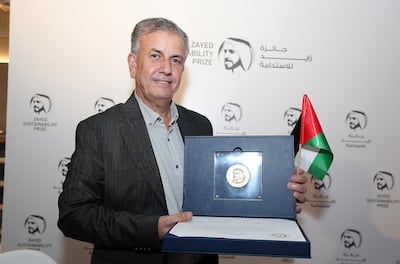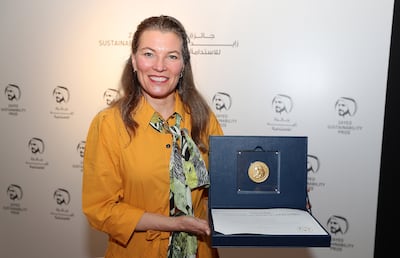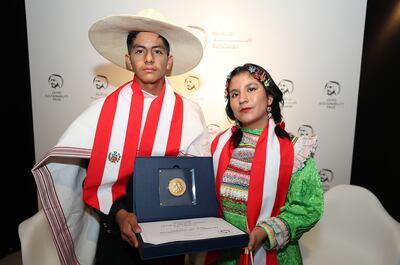From helping people in war-torn Gaza gain access to food to restoring ocean wilderness, every winner and nominee in this year's Zayed Sustainability Prize tells a story of improving the lives of others.
Eleven winners, across six categories, will share an increased prize fund of $5.9 million – boosted this week from $3.6 million. They were announced in Dubai at an awards ceremony at Al Wasl Plaza, Expo City, on Friday.
Their creative solutions have transformed lives and helped drive economic, environmental change in their areas.
Each winner in the health, food, water, energy and climate action categories will receive $1 million, while each of the six Global High Schools winners will get $150,000 to support their projects.
Gaza Urban and Peri-urban Agricultural Platform
Gaza Urban and Peri-urban Agricultural Platform, which won the food category, has helped more than 7,000 people to have access to local produce in the Gaza Strip and boosted the income of 200 female farmers.
Palestinian Ahmed Sourani, 57, founder and coordinator of the platform, said while it was a proud moment to win the award, his thoughts were still with those in Gaza.
“I am thrilled after winning the prize. It was a great moment and the prize will help to develop our work. But I cannot wait to return back to my family in south Gaza,” Mr Sourani told The National.
He crossed the Rafah border to Egypt and flew via Cairo to Dubai for the awards ceremony where his food platform was announced as the winner, ahead of projects in Kenya and Guatemala.

Launched in 2013, the non-profit organisation helps small-scale, female urban producers in Gaza by bringing together those involved in developing the Palestinian agricultural sector.
The platform has supported the production of 18 tons of local agricultural products.
“Female farmers’ products played a key role during the recent crisis in Gaza Strip as [they] helped to provide food to evacuated families who were hosted by other families in the south,” Mr Sourani said.
“Every house in Gaza became a refugee place that hosts five to eight families.”
He said the limited space in Gaza creates a big challenge for farmers.
“The prize will have a major impact on the project to enhance urban farming and support Palestinian women with small and micro-enterprises which will help our community for a better future,” Mr Sourani said.
“Palestinian people are looking for peace but not any peace. We want a real peace that respects the rights of our Palestinian people.”
Restoring ocean biodiversity

Kelp Blue from Namibia, winner in the climate change category, contributes to the restoration of natural ocean wilderness and the mitigation of excess CO2 by establishing large-scale kelp forests in deep waters.
“We were elated when we heard the results. It is spectacular and an honour to win the prize. Recognition is very important to us,” Caroline Slootweg, co-founder of Kelp Blue, told The National.
“The smaller companies who are trying their best need more spotlights to inspire others.”
The project, which has operations in Namibia, New Zealand and the US, cultivates the kelp forests in deep waters to restore ocean biodiversity and use the harvested kelp in farming and pharmaceutical applications.
The kelp helps to sequester 100,000 tons of CO2 annually and enhances ocean biodiversity and fish stocks.
Clean water for 35,000

Victor Sanchez Gutierrez, 16, a pupil from Colegio De Alto Rendimiento La Libertad high school in Peru, received the award in the high school category for a project that improves irrigation in a local water channel called La Mochica through phytoremediation – a process that uses plants to clean water.
La Mochica stems from the Moche River in Northern Peru. Plants were transplanted to the banks of the canal to absorb the mineral and organic contaminants.
“The project is water improvement in a channel built 3,000 years ago,” Victor told The National.
“It was constructed by an old culture called Cupisnique. Despite challenges, we managed to demonstrate how to solve problems in our community.”
Through the work of around 300 pupils, more than 35,000 Laredo residents will benefit from clean surface water.
“I feel emotional and overwhelmed because the project is showing results and the impact can be seen around the world,” Victor added.



































